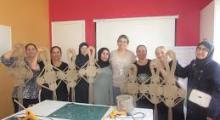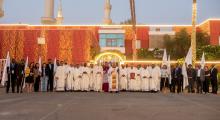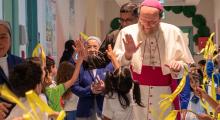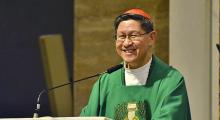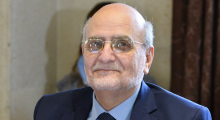Issued by the Catholic Center for Studies and Media - Jordan. Editor-in-chief Fr. Rif'at Bader - موقع أبونا abouna.org
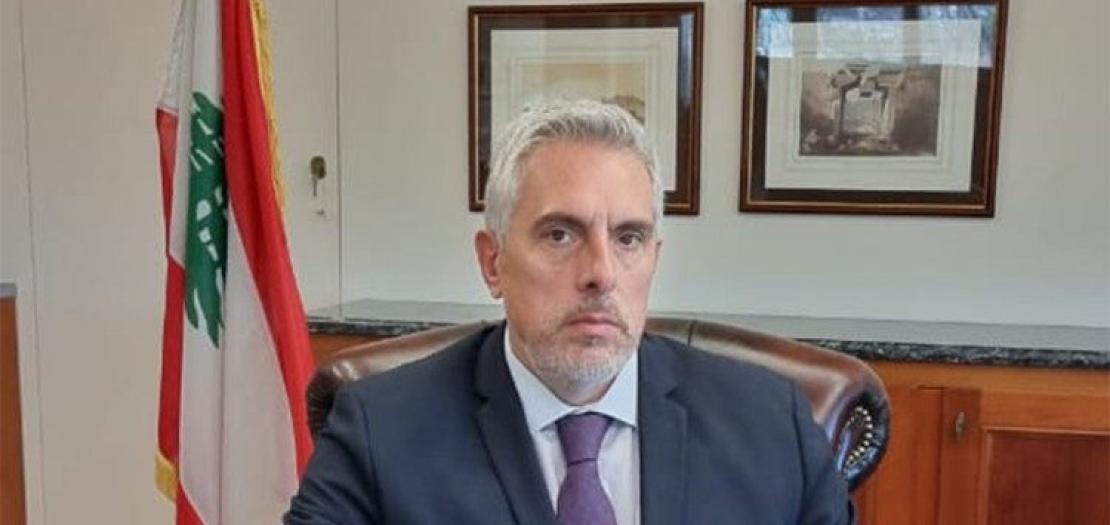
The recent election of internationally-backed army chief Joseph Aoun as the new President of Lebanon, along with the recent change of regime in neighbouring Syria is a major breakthrough, and could lead to further positive developments for Lebanon. That's according to the newly appointed Ambassador of Lebanon to the Holy See, Ghady El-Khoury.
Speaking to Vatican News’ Olivier Bonnel, after Pope Francis’ annual State of the World address to the Diplomatic Corps on 9 January, the Lebanese diplomat expressed optimism for Lebanon’s recovery and also gratitude for Pope Francis’ and the Holy See’s ongoing support to the Land of Cedars.
General Aoun, a Maronite Catholic, as required by the country’s confessional power-sharing system, was elected by the Lebanese Parliament on 9 January, ending 26 months of institutional stalemate and presidential vacuum, amid economic and social downfall and the fragile 60-day ceasefire between Israel and Iran-supported Hezbollah due to expire on January 26.
His election followed intense efforts of Saudi Arabia and the United States which rallied support for Aoun, who is close to Washington and Riyadh.
A new phase for Lebanon
Until last week negotiations over the successor of former President Michel Aoun, were at a standstill, due to ongoing divisions between the country’s factions.
However, the all-out war in Lebanon between Israel and Iranian-backed Hezbollah sparked by the Israel–Hamas war has changed the balance of forces in the country, making the appointment of Aoun possible. Without this war and its consequences, such a breakthrough would not have occurred in its current form.
Central to this development is the swearing speech the 61-year-old President delivered on 9 January, which underscored critical points shaping Lebanon’s upcoming political path marking a "new phase for the country," and outlined the immense challenges it faces, both internal and external.
Key among these points is consolidating arms under state control, limiting the responsibility of confronting Israel to the Lebanese Army, and imposing control over Palestinian refugee camps where until now Lebanese soldiers have not been allowed entry.
Contacts with new regime in Syria
These key points reflect a profound shift in Lebanese policy, which also include establishing new relations with neighbouring Syria after the toppling of Bashar al-Assad’s regime by a sweeping rebel offensive on December 8, 2024.
One of the first moves of the newly elected president was to send Lebanon's caretaker Prime Minister Najib Mikati to Damascus to meet with Syria's new strongman Ahmed al-Sharaa on 11 January in a bid to improve long-fraught ties, with the pair focusing on strengthening their shared border. The trip was the first visit by a Lebanese PM to neighbouring Syria in 15 years.
The appointment of General Aoun was greeted with widespread relief by the Lebanese people and the Christian community, including the head of the Maronite Church Patriarch Bechara Boutros Raï, who met Aoun on Friday, 10 January, and praised his inaugural speech as "the roadmap for the salvation of Lebanon.”
Cardinal Secretary of State Pietro Parolin, who has just concluded a visit to Jordan, also expressed to Vatican News his hope that the election will mark a new phase for Lebanon, where all political forces come together to find common ground and work for the good of the country, particularly for the reforms the country so urgently needs.
The right man at the right moment
Ambassador El-Khoury, who served as chargé d'affaires at his country's embassy in Paris for eleven years and was director of political and consular affairs at the Ministry of Foreign Affairs in Beirut before his appointment in Rome, shares this positive outlook describing Aoun as the right man at the right place at the right moment.
“He is the most trusted by the Lebanese, inspiring the most confidence for stability” he explained.
According to the Lebanese diplomat, the Vatican diplomacy which tirelessly worked to fill the presidential vacuum, has contributed significantly to solve the institutional stalemate. “We must be grateful for this”, he said, noting the constant concern n of the Holy See and Pope Francis for Lebanon.
Fostering Christian and Muslim peaceful co-existence in Lebanon
Ambassador El Koury stressed that this positive outcome is important for all Christians in the Middle East, but also for Muslims in Lebanon, ecalling that the country's unique value lies in its religious and cultural diversity and harmonious coexistence.
“Among Christians in the Middle East, there is a belief that ‘If Lebanese Christians are doing well, everyone is doing well.’ It is also crucial for Muslims to have Christians in Lebanon. Many friends tell me that Lebanon without Christians would lose all its value.”
Stability and peace in Syria is vital for Lebanon's recovery
Discussing Syria’s recent change of regime, El-Khoury also expressed cautious optimism about the potential for a democratic and stable Syria, emphasizing that such stability is crucial for Lebanon, given the deep historical, political, and economic ties between the two nations.
A peaceful Syria would contribute positively to Lebanon’s recovery, “A stable Syria can only reflect positively on Lebanon,” he argued, enabling both countries to shift their focus from conflict to their grave socio-economic challenges including a severe humanitarian crisis.
Daunting challenges
Turning to Lebanon’s internal challenges, El-Khoury outlined a comprehensive agenda for national recovery. Stability in the southern regions, resolving border disputes with Israel, and initiating reconstruction projects in war-torn areas such as Beirut’s southern suburbs and the Bekaa Valley are among the immediate priorities. At the same time, he stressed the importance of economic reforms, strengthening internal security, and modernizing the Lebanese Armed Forces, as called for by the international community.
The ambassador acknowledged the enormity of these tasks, given the country’s years of stagnation, instability political and financial mismanagement, but emphasized the need of tackling them simultaneously to rebuild Lebanon’s future.


